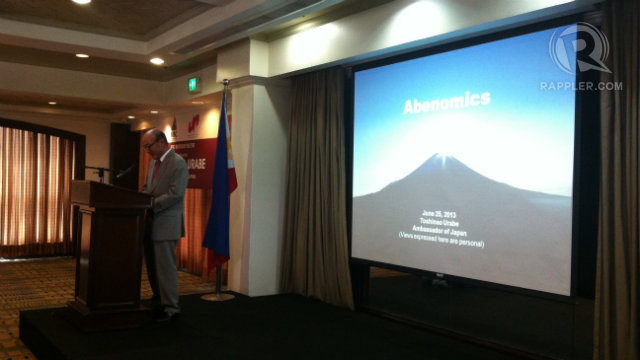SUMMARY
This is AI generated summarization, which may have errors. For context, always refer to the full article.

MANILA, Philippines – The Japanese ambassador to the Philippines stressed they are not discriminating against the Philippines in the latest proposals to revoke the Air Services Agreement (ASA) between the two countries.
Speaking at a Makati Business Club general membership meeting on Tuesday, June 25, Japanese ambassador to the Philippines, Toshinao Urabe said said it will honor the ASA between the Philippines and Japan.
“We are taking action. It’s not about not respecting the agreement. We are looking at it. We are not discriminating (against) the Philippines,” said Urabi in response to a question posed by former airline executive Avelino Zapanta.
Zapanta stressed that, since both countries are both members of the UN aviation body International Civil Aviation Organization (Icao), Japan should treat the Philippines as co-equal.
This question follows reports by the Civil Aviation Authority of the Philippines (CAAP) that Japan’s Civil Aeronautics Board (CAB) refused to allow Philippine carriers to increase flight frequencies to destinations n Japan.
This despite the Philippines’ passing of the International Civil Aviation Organization’s (Icao) safety audit, which should have resulted in the lifting of restrictions on Philippine-registered planes.
The CAAP announced that while Tokyo have yet to decline formally, requests by the Philippine government for the lifting of restrictions on local carriers have been ignored.
ICAO recently declared that CAAP has met international standards after an audit showed it had addressed safety concerns during the last 5 years.
The European Union had cited the Philippines’ failure to pass Icao’s safety audit as a basis for banning local airlines from mounting flights to any point within the economic bloc. The ban also meant that no Philippine carrier was allowed to enter EU airspace.
Prior to this in 2007, the United States Federal Aviation Administration (FAA) downgraded the Philippines to “Category 2” status. This also banned local airlines from adding new flights to the US, although existing services were not affected.
The FAA is scheduled to do its own audit on the Philippines later this 2013. – Rappler.com
Add a comment
How does this make you feel?
There are no comments yet. Add your comment to start the conversation.